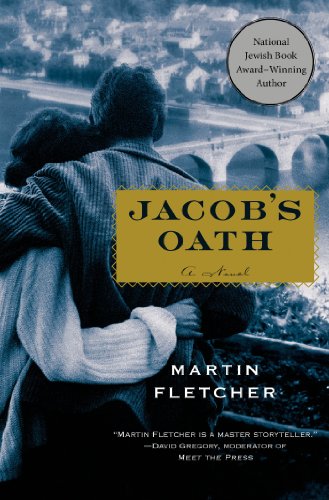Jacob’s Oath
The dichotomy between love and hate, between a desire for life and a desire for vengeance, is the theme of Martin Fletcher’s compelling post-Holocaust novel.
World War II has just ended when the book opens. Sarah remained hidden in Germany, and Jacob survived Bergen-Belsen. However, just days before liberation, his brother, Maxie, was killed by a Nazi officer known as “The Rat.” As Maxie lies dying, Jacob swears he will avenge his brother’s death. While most of the surviving German Jews were leaving Germany as quickly as possible, Jacob makes his way to his hometown of Heidelberg, knowing that “The Rat,” also from that town, will come home eventually. Improbably, Jacob and Sarah meet and fall in love.
Sarah is grappling with her own demons, dealing with tragic losses as well as surviving an act of violence after she is discovered hiding in a German home. The silver lining is her meeting with a Russian-Jewish soldier, Isak, whose friendship becomes her saving grace.
Jacob discovers that deep love and deep hatred are emotional cousins as his need for revenge becomes all-consuming, while simultaneously his love for Sarah is growing. Meanwhile, Sarah, who knows what they have to lose if Jacob goes through with his plan, continually tries to persuade Jacob to let it be.
The book is highly readable with insightful and fluid prose and a build-up of suspense. Fletcher, an international news correspondent, was a 2010 recipient of the National Jewish Book Award and has won several Emmys. Despite the serious subject matter, the author reminds the reader that even in the direst of circumstances, love can blossom, wounds can heal and life can begin anew.










